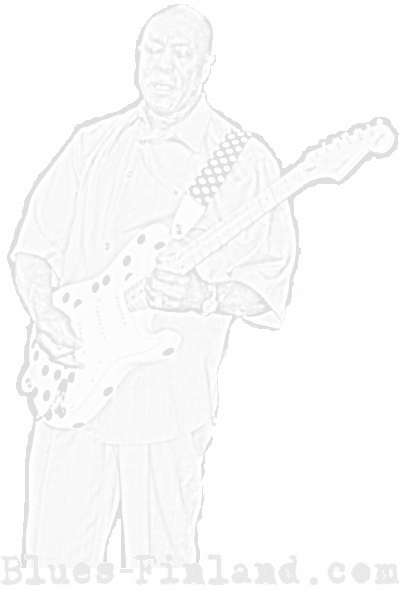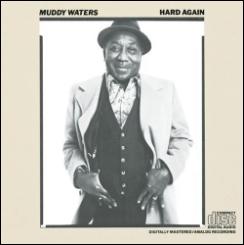 |
| Contact: admin (a) blues-finland.com © 2008 Blues-Finland.com |
| Postscript: Why Muddy? Published 11 September 2008 So what is it about Muddy Waters that makes him the towering figure over most things blues? Indeed, how come it was Muddy that was voted the biggest name in the blues by the readers of this very Blues-Finland.com in October 2007? Well, there are many ways to answer that, for Muddy’s talent manifested itself in great many ways; undoubtedly, different folks would choose to emphasize different aspects of the man, depending on their personal tastes and perspectives on the blues. And really, that is the answer – whereas any one of the key points listed below would have and have been sufficient to ensure a place in the blues pantheon for lesser artists, when it comes to Muddy, each of these accomplishments comes with the footnote “that, too”. |
 |
| A Mississippi Delta Bluesman Born in Mississippi, Muddy was as authentic a delta bluesman as any – a contemporary of Robert Johnson, a student of Son House, a bandmate of Henry “Son” Simms who had a formerly recorded with Charley Patton himself… From Muddy’s first recordings to the last, he was “our connection” to that first golden era of the blues, reworking and electrifying old delta themes for modern audiences, keeping up with the times, but never too far removed from Stovall’s plantation. The Inventor of Post-War Chicago Blues Granted, it is hardly objective to attribute such a major change in the music to any one person, but let’s face it – if we had to come up with just one name to embody post-war electric Chicago blues, it would be Muddy Waters. He plugged in his slide, unleashed the legion of amplified harpists that at one point threatened to put sax players out of business altogether, came out with the two-guitars-bass-drums-harp-and-piano line-up that’s still prevalent today, and while doing so, provided a soundtrack for the second half of the 20th century. In the 1950’s, his business cards reportedly read “Muddy Waters, King of the Blues” – well, he might have been bragging then for all he knew, but in retrospect, there aren’t that many people who would argue with that statement. The Blues & Rock Songbook There’s a handful of 20th century bluesmen whose combined repertoire accounts for 99% of the material covered by blues artists in the 21st century. Muddy stands as a major contributor, alongside Robert Johnson and Howlin’ Wolf, with the Sonny Boys, the Kings and John Lee Hooker framing the picture. Sure, we must distinguish between Muddy the composer and Muddy the performer, if only to give Willie Dixion & Co. a chance, but I would argue that it was Muddy’s interpretation as much as the “other writers’” penning skills that helped put these songs over. Godfather Of Rock The overdriven electric instruments, the classic Chicago line-up and the repertoire introduced by Muddy have exerted as strong an influence on rock music as they have on the blues. Says Keith Richards, the guy from that world-famous English band that was named after a Muddy Waters tune: “When I eventually got to hear Muddy Waters, it all fell into place for me. He was the thing I was looking for, the thing that pulled it all in for me. When I heard him I realized the connection between all the music I’d heard. He made it all explainable. He was like a codebook. I was incredibly inspired by him as a musician. He was more than a guitar player, more than a singer, more than a writer. It was all him. He was the hoochie-coochie man.” The Innovator Ironically, Muddy’s influence does not stop with rock. Hip-hoppers from Public Enemy down quote one of Muddy’s more “out there” albums “Electric Mud” as a huge influence; yes, the blues society still doesn’t quite register that LP, nor was Muddy himself all that keen on the sound, but it’s still something that he contributed and that continues to have a life of its own. After all, the great jazz innovator Miles Davis has been quoted as saying that he hated to go electric in the late 1960’s, he’d much rather have kept on playing acoustic ballads, but… We had to have someone plug a trumpet through a wah-wah pedal eventually, right? And there had to be someone to take the blues somewhere else just then, too – which Muddy did, for better or for worse. The Bandleader The 1991 “New Illustrated Rock Handbook” states that John Mayall “could fill a rock encyclopedia with the musicians he has nurtured”. If we crossed out “rock” and filled in “blues”, the same would apply double for Muddy Waters. Legendary harmonica players Little Walter, Junior Wells, James Cotton, Big Walter, Carey Bell, George “Harmonica” Smith, Mojo Buford, Paul Oscher and Jerry Portnoy all spent time with him on the road; Paul Butterfield recorded with the man, and Charlie Musselwhite built much of his initial reputation on being allowed to sit in with the Muddy Waters band. Guitar players? Jimmy Rogers, Buddy Guy, Hubert Sumlin and Bob Margolin first come to mind – or should you prefer, Phil Upchurch, Mike Bloomfield, Rory Gallagher and Johnny Winter. And yes, Muddy did his share to get Chuck Berry and Bo Diddley into the studio and out into the world. Piano players – try Otis Spann and Pinetop Perkins; drummers – well Willie “Big Eyes” Smith is still touring, isn’t he? Although with most of the long list above sadly departed, he has reinvented himself as a harmonica virtuoso… PPS: The Music Of course, I do realize that all of the above is just blah-blah-blah. For if you wake me up at 4 a.m., grab me by the throat and ask “Why Muddy?”, I wouldn’t pay none of that no rabbit. Instead, all I would be likely to mutter is “because the music is just that good!” And that’s the god’s honest truth. ANDRES ROOTS Recommended listening on CD: “The Complete Plantation Recordings” (Chess/MCA 1997) “His Best: 1947-1955” (Chess/MCA 1997) “His Best: 1956-1964” (Chess/MCA 1997) “At Newport” (Chess/MCA 1960/2001) “Electric Mud” (Chess/MCA 1968/1996) “Muddy “Mississippi” Waters Live” (Sony 1979/1989 - NB! not the 2003 2CD edition) Recommended reading: Biography 1: Mississippi Biography 2: Chicago Biography 3: Champagne & Reefer! The Muddy Waters Band Live in London 1968 |
